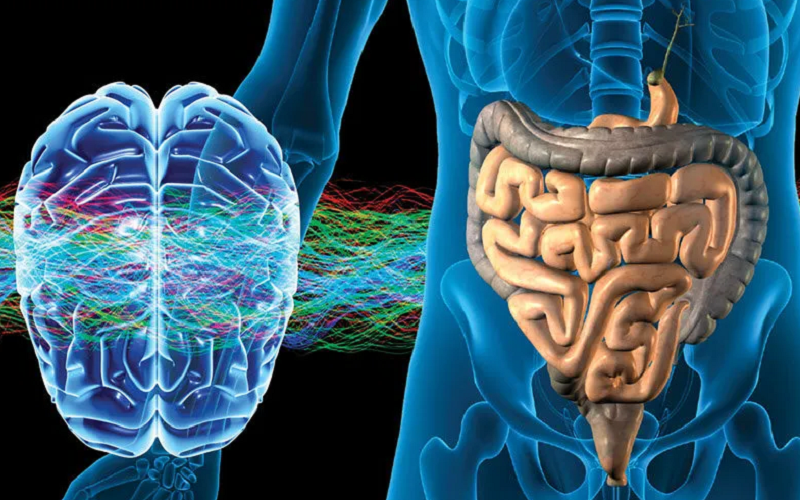
Feeling drained and struggling to get through the day is a common issue many face. What if the key to overcoming this fatigue and rediscovering your vitality lies in the intricate relationship between your mind and gut? Mind-gut coaching offers a revolutionary approach to health, emphasizing the profound connection between mental well-being and digestive health.
Contents
- Introduction to the Mind-Gut Connection and Coaching
- Understanding the Mind-Gut Connection
- Causes of Fatigue and Low Energy
- Principles of Mind-Gut Coaching
- Practical Strategies for Enhancing Vitality
- References
Introduction to the Mind-Gut Connection and Coaching
In recent years, the concept of the mind-gut connection has gained significant attention. Scientific research and personal testimonies alike have highlighted how deeply interconnected our mental and digestive health truly are. This growing awareness opens the door to new and effective approaches to health and wellness.
Definition Of Mind-Gut Coaching
Mind-gut coaching is a holistic method that focuses on optimizing both mental and digestive health. By addressing the unique relationship between the mind and the gut, this coaching approach helps individuals achieve balanced wellness. Mind-gut coaches work with clients to develop personalized strategies that foster harmony between these two critical systems.
Importance Of Addressing Fatigue And Energy Levels
Fatigue and low energy are common complaints that affect many people’s quality of life. These issues can stem from a variety of sources, including poor diet, stress, and lack of sleep. Addressing these underlying causes through mind-gut coaching can lead to significant improvements in overall energy levels and vitality, enabling individuals to live more fulfilling lives.
Understanding the Mind-Gut Connection
To fully appreciate how mind-gut coaching can transform your life, it is essential to understand the mind-gut connection. This complex relationship between your brain and digestive system plays a crucial role in your overall health and well-being.
The Science Behind the Mind-Gut Axis
The mind-gut axis is a bidirectional communication network linking the central nervous system and the enteric nervous system. This connection involves various pathways, including the nervous system, hormonal signaling, and immune responses.
Overview of the Gut-Brain Axis
The gut-brain axis is the communication highway between the brain and the gut. It involves direct and indirect pathways through which the brain and the gastrointestinal system influence each other. This interaction helps regulate digestive processes, mood, and even behavior.
Key Neurotransmitters and Hormones Involved
Key neurotransmitters and hormones, such as serotonin, dopamine, and cortisol, play significant roles in the gut-brain axis. Serotonin, for example, is predominantly produced in the gut and influences both mood and gut motility. Understanding these chemical messengers helps explain the profound connection between our mental state and digestive health [1].
How the Gut Affects Mental Health
The state of your gut can have a profound impact on your mental health. Research has shown that gut health is closely linked to mood disorders, anxiety, and even cognitive function.
Impact on Mood and Anxiety
An imbalance in gut flora, or dysbiosis, can lead to increased inflammation and altered production of neurotransmitters. These changes can contribute to mood disorders such as depression and anxiety. Improving gut health through diet and lifestyle changes can help alleviate these mental health issues.
Connection to Cognitive Function
Gut health also influences cognitive functions like memory and concentration. Inflammation in the gut can lead to neuroinflammation, impacting brain function and cognitive performance. Maintaining a healthy gut environment can therefore enhance mental clarity and cognitive abilities.
Role of Mental Health in Digestive Wellness
Just as gut health affects mental well-being, mental health also plays a crucial role in digestive wellness. Stress and other psychological factors can significantly impact digestive function.
Stress and Digestive Disorders
Chronic stress can lead to various digestive disorders, including irritable bowel syndrome (IBS) and acid reflux. The stress response affects gut motility and increases the permeability of the gut lining, leading to digestive discomfort and imbalances.
Psychological Impact on Gut Health
Mental health conditions such as anxiety and depression can exacerbate digestive issues, creating a vicious cycle. Addressing psychological factors through mind-gut coaching can help break this cycle, leading to improved gut health and overall well-being.

Causes of Fatigue and Low Energy
Understanding the root causes of fatigue and low energy is crucial for addressing these issues effectively. Several common factors contribute to these problems, impacting both physical and mental well-being.
Common Factors Contributing to Fatigue
Fatigue and low energy can result from various lifestyle and health factors. Identifying these contributors is the first step in developing effective strategies to combat them.
Poor Nutrition
One of the primary causes of fatigue is poor nutrition. A diet lacking in essential nutrients, vitamins, and minerals can lead to decreased energy levels and overall vitality. Consuming high amounts of processed foods, sugars, and unhealthy fats can further exacerbate the problem by causing energy spikes followed by crashes.
Chronic Stress
Chronic stress is another significant factor contributing to fatigue. When the body is under constant stress, it remains in a state of heightened alertness, which can lead to physical and mental exhaustion. Stress hormones like cortisol can disrupt sleep patterns and deplete energy reserves, leaving individuals feeling drained [2].
Sleep Deprivation
Sleep deprivation is a common yet often overlooked cause of low energy. Quality sleep is essential for the body to repair and rejuvenate. Lack of sufficient sleep can impair cognitive function, mood, and physical performance, leading to persistent feelings of tiredness.
Gut Health Issues Leading to Fatigue
Gut health plays a crucial role in overall energy levels. Various gut-related issues can contribute to fatigue, highlighting the importance of maintaining a healthy digestive system.
Dysbiosis and Imbalance in Gut Flora
Dysbiosis, an imbalance in the gut microbiota, can lead to a range of health issues, including fatigue. A healthy gut flora is essential for nutrient absorption and overall energy production. When the balance is disrupted, it can result in poor digestion, nutrient deficiencies, and low energy levels.
Leaky Gut Syndrome
Leaky gut syndrome occurs when the intestinal lining becomes permeable, allowing toxins and undigested food particles to enter the bloodstream. This condition can trigger an immune response, leading to inflammation and fatigue. Addressing leaky gut through dietary and lifestyle changes is vital for restoring energy levels.
Inflammatory Responses
Inflammation in the gut can contribute to systemic inflammation, affecting overall health and energy. Chronic inflammation can disrupt normal bodily functions and lead to feelings of fatigue. Reducing inflammatory triggers through diet and stress management can help improve energy levels.
Principles of Mind-Gut Coaching
Mind-gut coaching is a holistic approach that integrates mental and physical health to optimize overall well-being. This method focuses on the unique relationship between the mind and the gut, addressing both to achieve balanced health and vitality.
Holistic Approach to Health and Wellness
The foundation of mind-gut coaching lies in its holistic approach, which considers the entire person rather than just isolated symptoms. This method recognizes the interdependence of mental and physical health and aims to create harmony between the two.
Integrating Mental and Physical Health
Mind-gut coaching involves practices that promote both mental and physical health simultaneously. Techniques such as mindfulness, meditation, and stress management are integrated with dietary and lifestyle changes to ensure comprehensive well-being. This dual focus helps address the root causes of health issues, leading to more sustainable results [3].
Personalized Coaching Techniques
Every individual is unique, and mind-gut coaching respects this by offering personalized coaching techniques. Coaches work closely with clients to understand their specific needs, health conditions, and goals. This tailored approach ensures that strategies are effective and aligned with the individual’s lifestyle and preferences.
Key Components of Mind-Gut Coaching
Mind-gut coaching comprises several key components that work together to improve both mental and gut health. These components are designed to create a balanced and harmonious state of well-being.
Nutritional Guidance
Nutrition plays a crucial role in mind-gut coaching. Coaches provide guidance on incorporating nutrient-dense foods that support both gut and mental health. Probiotics, prebiotics, and anti-inflammatory foods are often recommended to promote a healthy gut environment and enhance overall vitality.
Stress Management Techniques
Effective stress management is a core aspect of mind-gut coaching. Techniques such as mindfulness meditation, deep breathing exercises, and yoga are used to reduce stress levels. By managing stress, individuals can improve their mental well-being and support a healthy gut-brain connection.
Mindfulness and Meditation Practices
Mindfulness and meditation are integral to mind-gut coaching. These practices help individuals become more aware of their thoughts and emotions, leading to better stress management and emotional regulation. Regular mindfulness and meditation practices can enhance mental clarity, reduce anxiety, and improve gut health.
Practical Strategies for Enhancing Vitality
Enhancing vitality involves adopting practical strategies that address both mental and physical health. These strategies are designed to boost energy levels, improve mood, and promote overall well-being. Here are some effective approaches to achieve this.
Nutritional Interventions
Diet plays a significant role in maintaining high energy levels and overall health. Making informed nutritional choices can have a profound impact on vitality.
Probiotic and Prebiotic Foods
Probiotic and prebiotic foods support a healthy gut microbiome, which is essential for good digestion and nutrient absorption. Probiotic foods like yogurt, kefir, and fermented vegetables introduce beneficial bacteria into the gut. Prebiotic foods, such as garlic, onions, and bananas, provide the necessary nutrients for these beneficial bacteria to thrive [4].
Anti-Inflammatory Diet Choices
An anti-inflammatory diet helps reduce systemic inflammation, which can contribute to fatigue and low energy. Incorporating foods rich in omega-3 fatty acids, such as fish, flaxseeds, and walnuts, can help combat inflammation. Other anti-inflammatory foods include leafy greens, berries, and turmeric.
Stress Reduction Techniques
Managing stress is crucial for maintaining high energy levels and mental clarity. Effective stress reduction techniques can significantly enhance vitality.
Mindfulness Meditation
Mindfulness meditation involves focusing on the present moment and cultivating a non-judgmental awareness of thoughts and feelings. Regular practice can reduce stress, improve emotional regulation, and enhance overall mental well-being. Even a few minutes of mindfulness meditation each day can make a noticeable difference.
Yoga and Relaxation Exercises
Yoga combines physical postures, breathing exercises, and meditation to promote relaxation and reduce stress. Regular yoga practice can improve flexibility, strength, and mental clarity. Other relaxation exercises, such as progressive muscle relaxation and deep breathing techniques, can also help manage stress and improve energy levels.
Improving Sleep Quality
Quality sleep is essential for restoring energy levels and maintaining overall health. Adopting practices that enhance sleep quality can lead to significant improvements in vitality.
Establishing a Sleep Routine
Creating a consistent sleep routine helps regulate the body’s internal clock, making it easier to fall asleep and wake up at the same time each day. Going to bed and waking up at the same time, even on weekends, can improve sleep quality. Establishing a relaxing pre-sleep routine, such as reading or taking a warm bath, can also signal the body that it is time to wind down.
Natural Sleep Aids and Supplements
Natural sleep aids, such as herbal teas like chamomile or valerian root, can promote relaxation and improve sleep quality. Supplements like melatonin can help regulate sleep-wake cycles, especially for individuals with disrupted sleep patterns. Consulting with a healthcare provider before using supplements is advisable to ensure safety and effectiveness.
References
[1] The Brain-Gut Connection
[2] Mind-Gut Connection: Your “Second Brain”
[3] The Mind-Gut Connection: How Stress Impacts Digestive Health
[4] The Emerging Role of Brain-Gut Therapies for Irritable Bowel Syndrome

